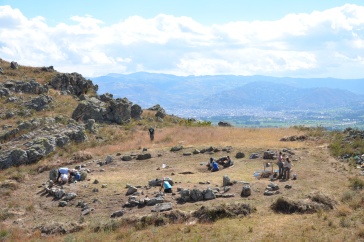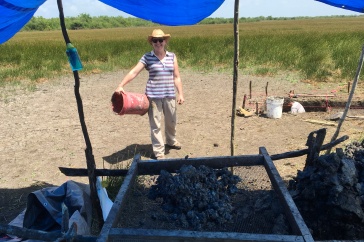
Students prepare for a broadcast at independent Italian news station Telejato. Owned by Pino Maniaci, daughter Letizia and son Giovanni, Telejato investigates corruption, including extortion and drug cartels in the province of Palermo. Courtesy photo
In Italy, shrines stand as testament to those who have been murdered by the mafia, and the trauma of those left behind has inspired a movement by educators, activists, artists and journalists striving for justice.
That movement has inspired Paula M. Salvio’s latest book, “The Story-Takers: Public Pedagogy, Transitional Justice, and Italy’s Non-Violent Protest Against the Mafia.”

Get To Know Paula Salvio
Paula Salvio writes and lectures on the cultural and historical foundations of education with a specialization in psychoanalysis, life-writing and the impact that marginalization, trauma and war have on women, children and youth in formal and informal educational settings.
Prior to “The Story-Takers,” she authored several other books and essays, including "Community-based Media Pedagogies: Listening in the Commons," co-written with professors Bronwen Low and Chloe Brushwood-Rose, and “Anne Sexton: Teacher of Weird Abundance,” which was awarded a Critics Choice Award by the American Educational Studies Association. She also co-edited “Love’s Return: Psychoanalytic Essays on Childhood, Teaching and Learning.”
She has received the Julius Silberger Fellowship at the Boston Psychoanalytic Society and Institute as well as the Roland and Charlotte Kimball Faculty Fellowship and Faculty Scholar in Education, Culture and Sustainability at UNH.
Read more about Paula Salvio.
Salvio, professor and chair in COLA’s education department and affiliate faculty in classics, humanities and Italian studies, shares the story behind her book and the discoveries she has made in her research and writing process.
UNH Today: What was the inspiration for this book?
Paula Salvio: Italy has a long history of non-violent protest against the mafia. In fact, while the mafia has generated enormous public attention, the antimafia has kept a very low profile. When I began this study in 2008, I wanted to understand the ways in which non-violent practices used by community organizers, educators, photo-journalists and artists were used to educate their communities about mafia violence in an age of neoliberalism. The source of inspiration for this work emerged from the ingenuity, sense of solidarity and courage of antimafia activists working in Sicily. Their work is particularly timely, given that the global and financial ambitions of today’s mafia are difficult to distinguish from that of global corporations.
UNH Today: Could you describe the research process involved in preparing to write this work?
Salvio: My research process is firmly grounded in archival research, which includes Facebook, blogs, spontaneous shrines and Tweets, and post-colonial narrative inquiry. It’s been said that the modern allure of the archive has much to do with a Freudian romance of finding all the lost things and names, whatever they might be: Things gone astray, lost, squandered, wasted. Jules Michelet described the archive as a site where the scholar breathes in the dust of the dead, communes with them and makes them live again. While this description remains open to serious critique, I admit that it calls out to me and influences my research process.
In the archive, I look not only for what is there but for what is absent or disappeared. This is evident in my chapter on antimafia activist Francesca Morvillo’s Facebook site. While the site was established to keep Morvillo’s memory alive, within weeks it was flooded with images and memories of her husband, antimafia prosecutor Giovanni Falcone. Her absence calls attention to the ways in which subjects left unprotected by the state and marginalized by society and culture can be cast into the oblivion of history, thus depriving future generations of the value of their memories and legacies. This is far too often the case when remembering female antimafia activists.
My approach to narrative research places a high value on the collaborative process of building narratives with the community members I write about. This process raises serious questions about who has the right to speak, the right to tell the story and the ethics of representation. The book’s title, “The Story-Takers,” takes its cue from the joint project of story-making between the one who listens and the one who tells a story that is vulnerable to being forgotten. Given the prevalence of omerta — the law of silence — where communities live under mafia rule, stories of resistance are far too easily lost.
UNH Today: Did you make any particularly unexpected discoveries in the process?
Salvio: Yes, I made several unexpected discoveries, but here, I’ll limit them to three.
First, I did not expect that the work of antimafia activists would challenge the pedagogical impulse of transitional justice in such a profound way. Too often, transitional justice narratives focus on experiences of victimhood rather than including narratives of non-violent resistance. The history and contemporary practices of the antimafia movements in Italy recognize and learn from those who took action, who engaged in dissent and who resisted and continue to resist state sanctioned violence.
Second, while I began this project with an understanding of the strong masculine presence in mafia and antimafia studies, I did not set out to write a feminist perspective on antimafia literature, but in many ways, that’s what I did. As the study unfolded, I found myself more and more focused on the ways in which women’s perspectives were absent from mainstream antimafia studies. I also began to understand the extent to which antimafia movements, like the mafia, have a masculine face that silences the unspectacular, but meaningful, cultural practices of fighting for legality in daily living.
Third, citizen and open-source journalism play major roles in antimafia education, particularly in an era when global media is becoming increasingly privatized.
While significant questions remain about the extent to which social media can impact social change, the citizen journalists working in Italy present compelling challenges to claims made by skeptics of citizen journalism that new media practices, such as blogging, posting, tweeting, function to neglect organization and revolt. In my research, I found that citizen journalists provide well-researched, in-depth exposés posted online, and in doing so, they insert themselves into the current news production process as curators of collective memory formation.
Of course, the mafia is expert at using the internet as well. Mafia violence knows no limit as it circulates on the ground and through communication channels on the net. They do track people down. Recently, one antimafia group, Libera, found their site hacked. The mafia left a skull and a cascade of death threats. Yet Libera carries on. They recognize — and here I paraphrase Pulitzer Prize-winning author Ta-Nehisi Coates — that you have to find peace within the chaos; you have to find some sort of mission in the chaos; you have to devote yourself to the struggle within the chaos, with no assurance that you will see any victory within your lifetime.
-
Written By:
Jennifer Saunders | Communications and Public Affairs | jennifer.saunders@unh.edu | 603-862-3585

















































